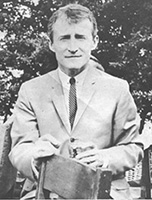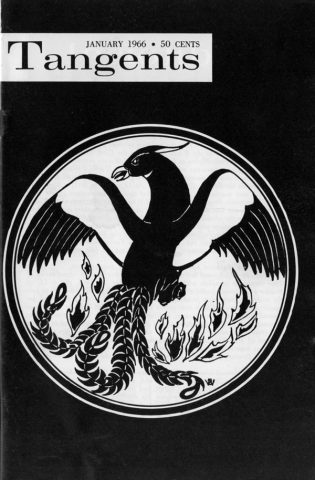1965: An Important Year for Homosexuals
Editorial by Don Slater
Tangents
January 1966 • Vol. 1 No. 4
Originally published in the January 1966 issue of Tangents
1965 was an important year for homosexuals.

The Bruce Scott decision was probably the signal event of the year. It dealt a fatal blow to the Federal Civil Service Commission policy that has long excluded, or sought to exclude, employees or applicants for employment, known to be, or even thought to be homosexual.
1965 was also the year when homosexual men and women began to demonstrate publicly for their civil rights, for the right to government employment and honest entry into the military services of their country. Picket lines in Washington at the White House and the Civil Service Commission building, and in Philadelphia at Independence Hall, were manned by members of the Mattachine Societies of Washington, New York, Philadelphia, and Chicago. Their orderly demonstrations were given coverage by all the major news media in the East.
1965 was marked by a well-attended two-day convention of the East Coast Homophile Organizations. While by no means the first of such conferences, this one was most successful and its roster of speakers distinguished.
1965 saw the formation of two Councils on Religion and the Homosexual, one in San Francisco and a second in Canada. It also saw the emergence of SIR, the Society for Individual Rights, and, on the Berkeley Campus of the University of California, the Sexual Freedom Forum which, white not primarily homosexual in interest, has given the subject fair and repeated attention.
Tangents Magazine has reported all of these developments.
But one which came late is of such significance that no retrospective of 1965 would be complete without it. On December 20, 1965, the ACLU of Southern California issued a policy statement declaring their intention to join the widening campaign favoring reforms in the law relating to sexual behavior. In support of their new policy the ACLU agreed to enter the case of Donald Odorizzi.
This Downey, California, elementary school teacher was arrested early in 1964 on a homosexual charge. Tangents succeeded in getting Mr. Odorizzi excellent representation and the charges were dismissed. But the fact of Mr. Odorizzi’s arrest, coupled with discussions of his sexual experiences tape-recorded at the Downey police station, caused him to lose his job. The Downey police had immediately notified the school authorities, of course.
The position of educational authorities universally is that homosexuality is concomitant to “immoral conduct,” and, therefore, homosexuals are unfit to teach. Mr. Odorizzi does not agree, and for long months he has fought a lonely, unpublicized battle to regain his teaching position and retain his teaching credentials. Tangents has supported him strongly all the way.
We urged the ACLU to take on his case.
That they have consented to do so is, in itself, a giant step in the fight to end discrimination against homosexuals, and a step toward providing truly equal opportunity for everyone.
![]()


